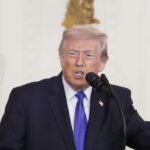If you paid attention to any kind of mainstream media outlet over the past week or so, you’ll have heard that President Donald Trump insinuated Ukrainian President Volodymyr Zelenskyy started the Russo-Ukraine war.
“I think I have the power to end this war. And I think it’s going very well,” Trump said at Mar-a-Lago in Florida before he departed to Saudi Arabia to meet with Russia without Ukrainian and — here’s the important part — other parties at the table.
“But today I heard, ‘Oh, well, we weren’t invited.’ Well, you’ve been there for three years,” he continued.
“You should’ve ended it in three years. You should have never started it. You could have made a deal. I could have made a deal for Ukraine that would have given them almost all of the land, … and no people would have been killed, and no city would have been demolished, and not one dome would have been knocked down.
“But they chose not to do it that way,” he added.
He went on to talk about former President Joe Biden, whose “pathetic” leadership he partially blamed for the war, and said that he had respect for Zelenskyy but wanted the war over.
“Look, you have leadership — and I like him personally. He’s fine,” Trump said.
“But I don’t care about personally. I care about getting the job done. You have leadership now that’s allowed a war to go on that should have never even happened, even without the United States.”
The Hill reported the first set of comments as definitely “referring to Ukraine,” despite the fact that Zelenskyy wasn’t mentioned in that portion of the comments. Most of the media played along, as well.
Based on the video, do you think Trump was blaming Zelenskyy for the war?
Yes: 0% (0 Votes)
No: 0% (0 Votes)
The Hill, for instance, noted that Ukraine had protested that the country wasn’t at the table at the meetings in Saudi Arabia: “Decisions on how to end the war in Ukraine cannot be made without Ukraine, nor can any conditions be imposed,” Zelenskky said Tuesday. “We were not invited to this Russian-American meeting in Saudi Arabia. It was a surprise for us, I think for many others as well.”
Social media was even more brutal:
The real game being played—Trump is part of a Kremlin-backed attempt to shift blame onto Ukraine for a war Putin started. pic.twitter.com/aw4ejUlXVU
— MaleX (@markpalexander) February 19, 2025
However, is this necessarily the case?
One thing is very, very abundantly clear from these remarks: They were sloppy. The president took an issue where the utmost precision and clarity was needed and decided to speak off the cuff; it is the first serious unforced rhetorical blunder of the new administration, and he’ll have to own that.
But note that there’s a very good — I would argue better — chance this was just a rhetorical blunder, not a factual one (where he believes Ukraine started the war) or a narrative one (where he doesn’t, but wants to pin it on them to advance the Kremlin’s through line regarding the Ukraine conflict).
Note the clip above. At about the 1:30 point, Trump turned his attention to another point of his ire in the conflict, which is the fact that NATO nations’ refusal to live up to their treaty obligations in terms of defense spending left the alliance weak in the run-up to the war, something he spent a goodly portion of his first administration trying to rectify.
“They have to pay. They have to find out: Where is the money going to?” Trump said, specifically speaking of Europe, before saying Zelenskyy didn’t have a full accounting of the money that had been spent there.
“I think Europe has given a $100 billion, and we’ve given, let’s say $300 plus [billion],” he continued. “And it’s more important for them than it is for us. We have an ocean in between, and they don’t.”
He then went back to the accounting, before coming to the quote that the media leapt at — or, if the media were comprised of Republicans, “pounced upon” — about having a spot at the table.
And here’s the the thing: Just as loudly as Ukraine has, Europe has loudly protested that they need to be at the table, too.
German Defense Minister Boris Pistorius, he of the infamous J.D. Vance lecture: “For me, it’s clear … that Europe must be involved in the negotiations — and I think that’s very easy to understand [if Europe is] supposed to play a central or the main role in the peace order.”
NATO Secretary General Mark Rutte, of the Netherlands: “Let me absolutely assure you that I know that many European countries are already thinking that if there would be a peace deal with Ukraine, what could you contribute? And I was a bit surprised that when the news of the phone calls and also what happened to the defense ministers meeting in Brussels came out, their reaction was a little bit like, ‘Hey, we want to be at the table,’ and, ‘Why are we not at the table,’ instead of coming up with concrete proposals … And Europe has to fight its way to the table by being relevant in terms of spending and also good proposals.”
European Union Representative of Foreign Affairs and Security Policy Kaja Kallas, the E.U.’s top diplomat: “It is clear that any deal behind our backs will not work. Any agreement will need also Ukraine and Europe being part of it, and this is clear that appeasement also always, always fails.”
French Foreign Minister Jean-Noël Barrot: “There will be no just and lasting peace in Ukraine without the participation of Europeans.”
Swedish Defense Minister Pål Jonson, according to Breaking Defense: “Europe must also have a say in peace negotiations noted Jonson, because the continent has supplied around 60 percent of all military aid to Ukraine over the last year alone.”
Estonian Defense Minister Hanno Pevkur: “We have to be there. So there is no question about it. Otherwise, this peace will not be long lasting.”
Obviously, all these diplomats also made noise when they made these statements over the past week over Ukraine being at the table. But then, after that perfunctory noise, talk of why they needed to be there, too.
I will reiterate, so that this is crystal clear: Trump’s remarks were muddled and clearly off-teleprompter on a matter where total clarity needed to be a priority. This has been less of a problem during this administration, but as a man prone to off-the-cuff remarks, we knew it would arise.
In a case where clarity isn’t apparent, however, did nobody find it strange that everyone immediately defaulted to the worst-case interpretation?
Has Trump ever waffled on who started the war? No, his facts on this have always been very clear: Russia invaded Ukraine. He hasn’t shifted the blame on that matter, although he’s been critical of both the Biden administration and NATO allies for what he sees as letting the situation develop disadvantageously for Kyiv.
While Trump often exaggerates, he’s not hyperbolically silly or demonstrably prone to forgetting obvious historical facts.
We also know that the European Union has been there as long as NATO in terms of providing support and that this was part of why Trump spent much of his first term lecturing NATO nations about spending their required share of resources on defense instead of skating by on U.S. support.
Furthermore, Europe made itself unusually dependent upon Russia as a trusted ally, particularly when it came to supplying energy. Again, the United States under the Trump administration repeatedly stressed that this was a poor idea. And, in the months before the war, both the Biden administration and NATO waffled publicly on allowing Ukraine to join while privately telling Zelenskyy that it wasn’t an option on the table, something libertarian outlet Reason’s Matthew Petti called “the worst of both worlds.”
“The Russian government was convinced that NATO intended to use Ukraine as a weapon against Russia, while Ukrainians themselves were left in limbo,” he wrote. “In fact, the invitation for Ukraine to join the alliance — just not now — may have given Russia an incentive to attack as quickly as it could and drag the war out as long as possible.”
Trump, in his remarks, doesn’t refer to who “they” are, although it’s worth noting this is plural. (It could mean all the Ukrainians, it feels more like the assembled nations of NATO and the E.U., but that’s anyone’s guess — again Trump’s fault, but not dispositive proof this guy has no clue about recent world history, lest he’d be negotiating with Kyiv, and not Moscow, to stop the war if he were really convinced they started it.)
Furthermore, it came during a part of the speech when he was talking about Europe’s role in Ukraine, not Ukraine’s part in starting the war. Again, yes, apportion all blame for inexactitude. But also look at the proximity of what he said to what he was saying in a more exact manner — the topic was Europe and their role in Ukraine, not Ukraine and their role in negotiations. Thus, the interpretation that this is about Europe demanding a role at the table holds a great deal of water, if not more water.
And if this is what he said, then yes, Trump is right: Europe has been more or less useless at stopping the conflict or even doing more than pumping in enough money and materiel to keep it at a standstill, though nowhere near as much as the United States. If they’ve been there for three years and they now think demanding a seat at the table will result in a lasting peace when it’s clear that their problems with the U.S. leading the negotiations is that the U.S. is also led by Donald Trump, this logic seems flawed at best.
But again, we’ll likely never know unless Trump specifically tells us who or what he was talking about — and the White House will likely retcon this one no matter what, which is what a White House is supposed to do.
The point is this: The sloppiness on the president should not be defended because — quite predictably — vague, unscripted language on very serious subject matter will never end well, even for a guy who does it well in other contexts.
However, we also shouldn’t defend should media outlets that, given two contextual interpretations in a vague set of remarks, go for the most damning (if equally or less likely) one because it makes better headlines or abets a disinterest in nuance.
And that’s what this is: Unless the White House specifically comes out and says that, yes, the administration’s official interpretation is that Ukraine started the Russo-Ukraine war, it seems like it might be just slightly important to clarify who exactly the president was talking about when he said some party X “should have never started it.”
Advertise with The Western Journal and reach millions of highly engaged readers, while supporting our work. Advertise Today.






